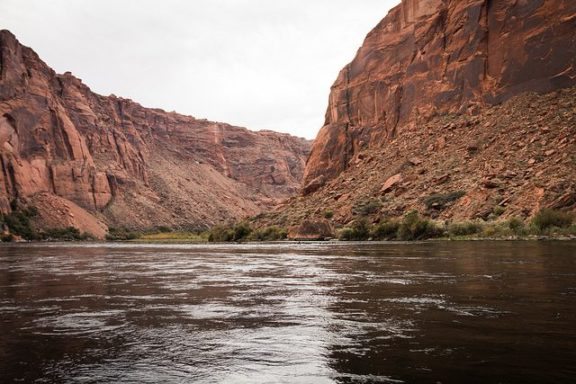
April 12, 2017; Arizona Daily Sun
Lake Mead is shrinking. The lake, one of the largest manmade lakes on the continent, created in 1935 by the Hoover Dam, is fed by the Colorado River as it flows south.
The lake, located about 25 miles from Las Vegas, Nevada, has not been at full capacity since 1983. Since 2000, the lake has lost 19 percent of its overall volume while increasing population has increased demands for the lake’s water. The journal Water Resources Research published a study in February that demonstrated the contributing stress of drought and climate change on the river. In short, the study estimates that one-third of the lake’s decline since 2000 is attributable to higher average temperatures in the basin, which in turn the study attributes to climate change. In February 2017, Lake Mead only held 42 percent of capacity, and that’s in advance of the level drop that comes with the summer sun.
Arizona, Nevada, and California state water managers, along with federal managers, have been negotiating for several years to decrease use of the Colorado River’s water. In December, they announced they did not have an agreement and that negotiations would continue into the new president’s administration. As is often the case, a nonprofit has stepped up to move the needle. American Rivers Inc. has released an updated list of America’s Most Endangered Rivers® for 2017, with the Colorado River at number one. (The Colorado topped that list in 2015 and 2013, too.)
“The communities, economy and natural resources of the southwestern U.S. will be threatened if the Trump administration and Congress don’t prioritize and fund innovative water management solutions,” American Rivers wrote in a press release announcing the list on Tuesday.
Sign up for our free newsletters
Subscribe to NPQ's newsletters to have our top stories delivered directly to your inbox.
By signing up, you agree to our privacy policy and terms of use, and to receive messages from NPQ and our partners.
Major steps have been made by lower basin states and the federal government of the previous administration to figure out how to do more with less water, said Matt Rice, Colorado Basin director for American Rivers.
The president’s proposed budget includes significant cuts for agencies like the Bureau of Reclamation and the Department of Agriculture. Their programs, such as drought contingency and water conservation, will be vital to saving the ecosystem of the Colorado River and the communities the river touches economically and recreationally. In particular, the drought contingency programs will affect both the United States and Mexico via the bilateral agreement that shares future drought-related water cuts and wetlands protection. The current agreement expires this year.
American Rivers was founded in 1984 with a simple mission statement: “American Rivers protects wild rivers, restores damaged rivers, and conserves clean water for people and nature.” They have been involved in the removal of 200 dams and 16 million pounds of trash from waterways. The nonprofit might want to consider the successes India and New Zealand have had with giving vital resources a kind of personhood, similar to corporations in the U.S.
Mr. Rice expressed concern that this past winter’s excessive snow and rainfall, following the drought of several years, will “reduce the sense of urgency to complete the drought contingency plan.” As time goes on, Lake Mead slips further and further away from recovery.—Marian Conway













